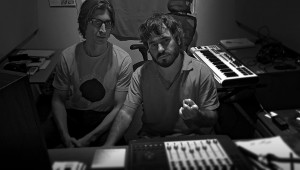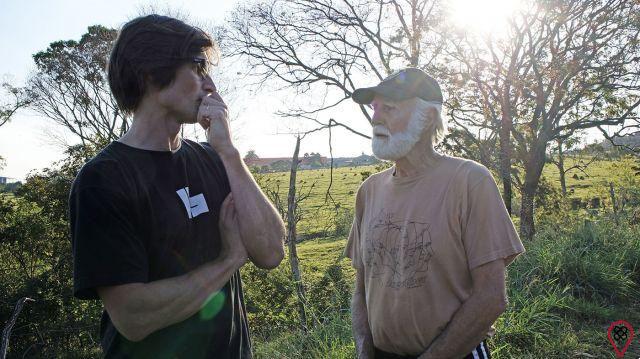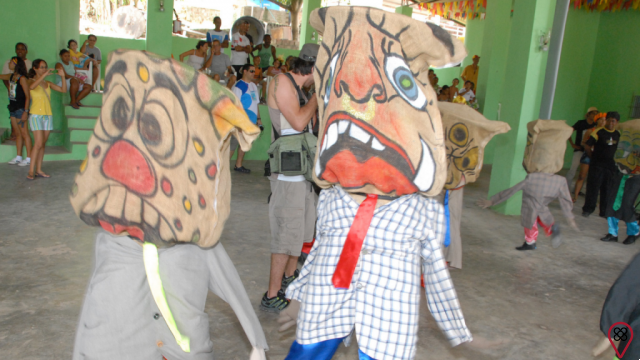The film directed by Gabriel Martinez tells the story of six people over sixty who reinvented themselves, proposed new experiences and broke paradigms. Meet Aging, a production that debuted a few months ago.
 We often have something taxing in relation to the elderly. As if from that age it was difficult to start doing something new or putting an old and old dream into practice. Director Gabriel managed to capture the essence of this age well, without putting aside the difficulties of the phase, but also removing the idea that it is no longer time to move, after all, plans and projects continue to be important. Check out the interview with the director:
We often have something taxing in relation to the elderly. As if from that age it was difficult to start doing something new or putting an old and old dream into practice. Director Gabriel managed to capture the essence of this age well, without putting aside the difficulties of the phase, but also removing the idea that it is no longer time to move, after all, plans and projects continue to be important. Check out the interview with the director:
Eu sem Fronteiras: How did you come up with the idea of making Aging?
Gabriel Martinez: I always wanted to work with documentaries, in 2012 a friend of mine (Ruggero Fiandanese), who at the time worked with me at the production company, suggested some themes to develop a documentary. Among the suggested themes was “Old age”, this was a theme that caught my attention at the time, I have always admired people who face old age in a positive way. I was 34 years old and every now and then it crossed my mind that I was too old to start making documentaries, that I should have started at 20, 24... point is old age or not a misinterpretation of our perception?”, “When, in fact, are we too old to start something new?”. We did a quick research and we already came across some characters (who are in the film today), from then on I started to get more and more enchanted by the theme. We dove into research and then came the part of enrolling in tax incentive laws and, later, attracting sponsorship…
Me without Borders: How much research and recording time?
Gabriel Martinez: The character research was done in 2012. After having found six interesting characters I thought it would be good to keep that number of respondents, so we can feel more of each one in the film. If we had 20 characters, I would end up having very little time to talk about each one. The specialists (Alexandre Kalache, Mirian Goldenberg, Mario Sergio Cortella) were defined only in 2014. Production time was six months.
Me without Borders: How was the repercussion of the film?
Gabriel Martinez: Very cool and still is. I receive many testimonials from people who are delighted and enthusiastic about the film. I am very happy to see that it serves as a liberating piece for many people. It makes all the difference, makes all the work worthwhile.
Me without Borders: Has your idea of old age changed after the documentary?
Gabriel Martinez: Yes, from the moment of the research until the conclusion of the filming it is really a new perception that is understood when we run a half marathon next to an 84-year-old or when we surf with a 68-year-old. Today I have empirical examples of what the mature life, examples that I didn't have before.
Me without Borders: How do you see old age?
Gabriel Martinez: In my view, old age cannot be interpreted as “the best age”. In my opinion, the “best age”, if it were feasible, would be the experience we have at 80 with the physical (and cognitive) vigor of our 20 years. That's not possible. But our life after 60, 70, 80 is open to countless possibilities, we must have the right look and interpretation of the facts. This is the idea I want to express in the film.
As stated by Alexandre Kalache in the documentary “There is no doubt that old age will present you with challenges”, but these challenges do not prevent you from passing the entrance exam at 76 and graduating in medicine at 82, in the same way that don't stop you from skydiving at age 76 or racing at age 84. I worked with more extreme examples in the film (surfing, parachuting, tattooing, running, aikido) precisely to exemplify that our limits often depend much more on our perception than on our possibilities, as Cortella said in his statement “Limits are borders, are not barriers”. Another important reflection is raised by Mirian Goldenberg “We have to have big or even small life projects”, no one needs to do something extreme to experience good aging, but we do need to always pursue our goals, whether big or small.

Eu sem Fronteiras: What is the biggest difficulty they face?
Gabriel Martinez: I wouldn't be able to answer that question for them. We all have adversities in our path and the lives of those interviewed were no different. What I can say is that they all have in common a very concrete desire to fulfill their desires, regardless of the bad weather that comes their way. I think the path for anyone is not to focus on difficulties, but on possibilities.
Me without Borders: Are there many characters reinventing themselves at this stage and putting dreams into reality?
Gabriel Martinez: I believe that age is no longer seen as a barrier that prevents us from performing a new activity. The six characters in the film show us through their lives, each in their own particular universe, that many paths are possible after the age of 60, I hope to be able to contribute to spreading this conviction even more with the documentary.
Eu sem Fronteiras: Which story caught your attention the most?
Gabriel Martinez: All are great. Each one has its peculiar strength and enchantment, it is difficult to list just one in a way that stands out from the others.
Eu sem Fronteiras: How was your relationship with the participants when they heard your stories and experiences?
Gabriel Martinez: My relationship with the characters was one of friendship. I had already interviewed everyone (except Luiz Schirmer who lives in Florianópolis) previously in 2012. I already knew the stories and that's why I was very comfortable with the characters during filming in 2014, I believe that the well-being between the team and interviewees is crucial in a documentary environment.
Me without Borders: What are the next plans?
Gabriel Martinez: I have some projects that are in pre-production. As I know that the road until it comes to fruition is still long… I prefer not to comment at the moment, I will leave it to comment when I have already obtained sponsorship.
Me without Borders: How was the selection of characters?
Gabriel Martinez: With the exception of Ono Sensei, who was recommended by a friend, they were all found through the internet. Judith Caggiano, Edson Gambuggi, Oswaldo Silveira, Edmea Correa and Luiz Schirmer had already appeared in the media at some point. Along with them we found many possible interesting characters, when turning the script into a film I had to choose a path. That's when I decided to work with only six characters, so I would have more time to delve into the story of each one (considering a 74-minute feature film, I ended up with 84 minutes of film). We have an average of 12 minutes per character and the rest of the time filled with expert commentary. The specialists were also an arduous process of selection, there are many interesting and competent people in the area. I chose to take a gerontologist (Alexandre Kalache), an anthropologist (Mirian Goldenberg) and a philosopher (Mário Sérgio Cortella), so that each one would have a different background for the theme. I attended many lectures by the three selected to study them. When I read the book “Beautiful Old Age” by Mirian Goldenberg, I knew she had to be in the movie. In the same way, I was fascinated by the book “We Live More, Do We Live Well?” by Mario Sergio Cortella. Alexandre Kalache is a reference on the subject, it was from an interview with him (in 2012) that I heard the term Aging, I liked it and decided to title the film that way.
*note: Alexandre Kalache no longer uses the term Aging, he changed it to Gerontolescence due to the fact that he participates in many lectures outside of España, the translation of the term Gerontolesciencia works much better into English (“Gerontolescence”).
about the trail
The film's soundtrack has been highly praised and it is a source of great pride to have worked with Music Director Marcelo Fruet, from Porto Alegre, just like me. Marcelo is the interpreter of the adapted cover of the song Envelheser (Arnaldo Antunes) theme from the movie Envelhecência. (Attached is a photo of me and Marcelo Fruet in his studio in Porto Alegre).
• Interview conducted by Angelica Weise from the Eu Sem Fronteiras Team

























